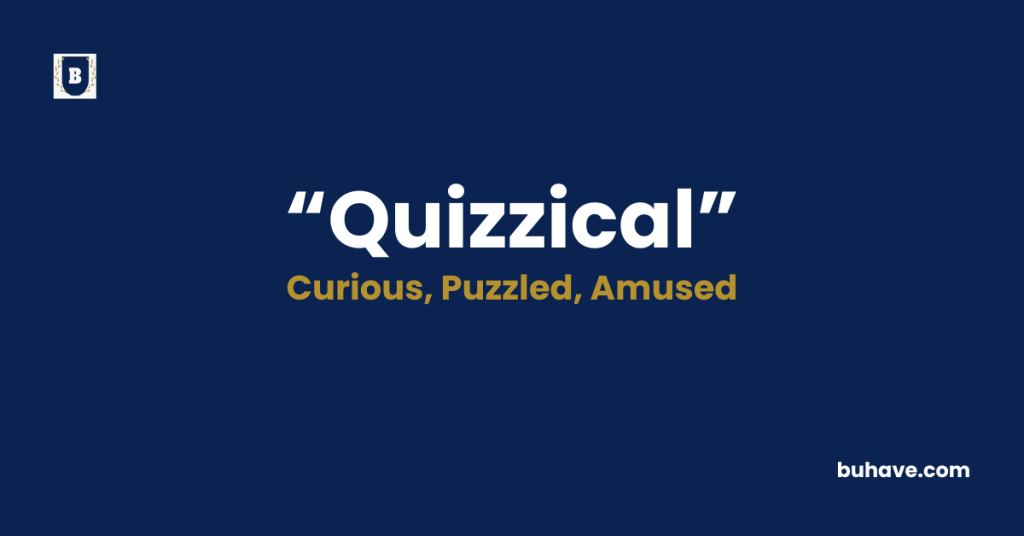The word ‘Quizzical’ (Adjective) describes a look, tone, or expression that shows mild amusement, curiosity, confusion, or disbelief—often with a hint of playful questioning. In this guide, you’ll learn the full definition, synonyms, antonyms, etymology, and real-life examples of how to use ‘Quizzical’ correctly in sentences.
Quizzical Explained in Depth
A complete and detailed guide to the words Quizzical including meaning, definition, examples, etymology, synonyms, and antonyms.
Meanings of Quizzical
“Quizzical” means showing or indicating mild puzzlement, curiosity, or humorous disbelief—often with a questioning look or tone. It’s commonly used to describe someone’s facial expression or reaction when they’re amused or confused, but not in a harsh or critical way.
You might notice a quizzical tone in someone’s voice when they’re asking a playful question or trying to understand something that seems out of the ordinary. It’s the kind of expression you might see when someone hears a strange idea, notices something unusual, or is gently teasing. In social situations, being quizzical can show thoughtfulness or engagement it means the person is paying attention and reacting with curiosity rather than dismissal.
Definition
“Quizzical” means showing or indicating mild puzzlement, curiosity, or humorous disbelief often with a questioning look or tone. It’s commonly used to describe someone’s facial expression or reaction when they’re amused or confused, but not in a harsh or critical way.
Etymology
The word “quizzical” originated in the late 18th century and stems from the noun “quiz,” which originally meant an odd or eccentric person in English slang. Over time, “quiz” evolved to mean a test of knowledge or a question, and the adjective “quizzical” developed from the idea of looking at something in a questioning or puzzled way.
The root word “quiz” may have uncertain origins, but some believe it could have been invented as a practical joke or as part of theatrical slang. The suffix “-ical” is used to form adjectives, typically meaning “pertaining to” or “characteristic of.” Therefore, “quizzical” essentially came to mean “characteristic of questioning or puzzlement.” It entered regular use in the English language by the early 1800s and has since become a common way to describe looks or tones that express curiosity or bemusement.
Example Sentences
- She gave him a quizzical glance, unsure if he was joking or serious.
- The cat tilted its head in a quizzical manner, staring at the toy with wide eyes.
- His quizzical smile made it hard to tell whether he was impressed or confused.
- They exchanged quizzical looks when the presenter made a strange comment.
- The teacher looked at the student quizzically, waiting for clarification on the unusual answer.
Quizzical Synonyms
- Inquisitive
- Curious
- Puzzled
- Perplexed
- Bemused
- Confused
- Playful
- Amused
- Questioning
- Skeptical
Quizzical Antonyms
- Understanding
- Knowing
- Certain
- Serious
- Straightforward
- Uninterested
- Indifferent
- Clear
- Definite
- Resolved
FAQs about Quizzical
Here are some frequently asked questions (FAQs) about the word “Quizzical”
1. What does “quizzical” mean?
“Quizzical” describes an expression or attitude that shows curiosity, amusement, or puzzlement, often with a subtle or humorous tone.
2. Can “quizzical” describe a voice or tone?
Yes, someone can speak in a quizzical tone, indicating that they’re asking a question or reacting with slight confusion or humor.
3. Is a quizzical look negative?
Not usually. A quizzical look is often gentle, playful, or thoughtful—it shows interest or curiosity rather than anger or criticism.
4. What is the difference between “quizzical” and “confused”?
“Confused” implies a lack of understanding, while “quizzical” suggests mild confusion mixed with curiosity or amusement.
5. Can children have a quizzical expression?
Absolutely. Children often show quizzical expressions when learning something new or encountering something unexpected or funny.
6. Where is “quizzical” used most commonly?
It’s often used in conversation, storytelling, literature, and descriptions of body language or dialogue to express subtle, questioning reactions.
7. Is “quizzical” formal or informal?
It’s mostly neutral and works in both casual and formal contexts, especially in writing and description.






